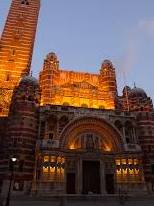
 AST WEEK I wrote about the ingredients of a choir school, or choral foundation, at the heart of which is the goal of creating a liturgical choir worthy of the name. I wrote that the creation of a school is not the end goal, rather, the creation of the choir is. Still, I believe that the school can be an immense help toward our goal, because it allows for daily rehearsals, instruction in music theory, liturgy, theology and most importantly, a more regular schedule of singing for the Liturgy, whether for Holy Mass or the Divine Office. I want to briefly touch on what I feel is necessary for a school of this kind.
AST WEEK I wrote about the ingredients of a choir school, or choral foundation, at the heart of which is the goal of creating a liturgical choir worthy of the name. I wrote that the creation of a school is not the end goal, rather, the creation of the choir is. Still, I believe that the school can be an immense help toward our goal, because it allows for daily rehearsals, instruction in music theory, liturgy, theology and most importantly, a more regular schedule of singing for the Liturgy, whether for Holy Mass or the Divine Office. I want to briefly touch on what I feel is necessary for a school of this kind.
First, you need both a pastor and music director who understand that the Liturgy is both the source and summit of the Christian life. How often we hear this phrase thrown about, yet never understood. We will not make the Liturgy the source and summit of our lives by conforming it to the world. It is the other way around. Of course, music plays a large role in the liturgy because of its intimate nature with the sacred text. Gregorian chant and polyphony, both recommended by the Second Vatican Council should be understood to form the foundation of a solid choral program.
Secondly, you need a principal who is at least supportive of the desires of the pastor and director of music and allows the time necessary during the school day to build such a choral program. I think some of the contention between principals and school music programs comes from the fact that most children in our parochial schools can’t sing a major scale, much less know what it is, after 8 years of music instruction. If I were a principal and saw a music program failing my pupils, I wouldn’t mind getting rid of it. However, if I saw my students were having fun singing and moving in groups, learning how to sight-sing and play instruments and then singing to a professional standard at school Masses, I would be much more inclined to give everything I could to make such a program happen in my school. I think many principals would agree.
Thirdly, you need a music teacher who loves and inspires children, has a thorough grounding in voice, music theory, teaching and who is a professional musicians. This is not the time to hire someone of good will, but who doesn’t have the skills. I remember reading once that Kodaly didn’t so much care who was in charge of symphonies and opera houses, he was more concerned with who was teaching in the schools, because that would determine the future state of music in his nation.
Lastly, it goes without saying that you need children for your program and a school provides that much easier than trying to coax and round up children from various area schools. If you create a culture of great music in your parish school, most students will want to take part. Then you don’t really have to recruit!

